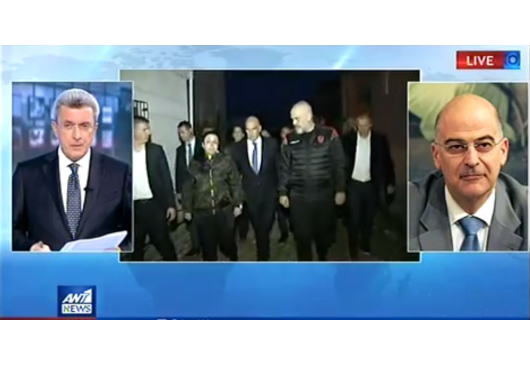 JOURNALIST: We will now speak with the Minister of Foreign Affairs, Nikos Dendias, who made an urgent visit to Tirana immediately after his visit to Skopje. Good evening, Minister.
JOURNALIST: We will now speak with the Minister of Foreign Affairs, Nikos Dendias, who made an urgent visit to Tirana immediately after his visit to Skopje. Good evening, Minister.
N. DENDIAS: Good evening, Mr. Hatzinikolaou. Good evening to your viewers.
JOURNALIST: We want you to describe the climate in Tirana and tell us how Greece is helping our neighbouring country.
N. DENDIAS: Mr. Hatzinikolaou, first of all I went to Durrës with Mr. Rama and our Ambassador here, Ms. Filippidou. And we went to where the buildings had collapsed and watched the efforts to rescue trapped victims. Our country, on the orders of the Prime Minister, Kyriakos Mitsotakis, had sent two Disaster Management Units (EMAK), which are already operating.
Greece is among the first countries, if not the first, to offer assistance and expertise, because we unfortunately have experience with earthquakes, as you well know. We are also doing everything we can to assist with the Albanian government’s communication with the European Union, the European Civil Protection Mechanism, through the Cypriot Commissioner, Mr. Stylianides, to help the Albanian government meet the great needs of this very difficult time.
There has been extensive destruction, many people are outside their homes in outdoor camps, in a stadium prepared by the Albanian government. But as you are well aware from our experience, this is a very difficult situation that is not at all easy to handle. The earthquake was very strong. Ten miles from the coast, with a shallow epicentre – I was told this by the Albanian Prime Minister, with whom I visited the disaster site. In general there is very extensive damage from the earthquake in Albania.
JOURNALIST: Thank you very much, Minister.
N. DENDIAS: Thank you, Mr. Hatzinikolaou.
November 26, 2019


